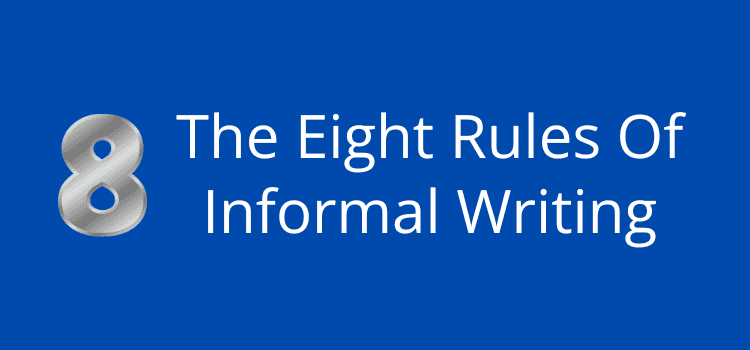
When you write fiction, articles, or blog posts, you usually use informal writing. It’s also the most common form of writing for messages, personal emails, and social media posts.
You know that it’s a conversational style with simpler structures than formal writing. But how do we define it, and how can you be sure you are not mixing different writing styles?
Like all forms of writing, you need to be consistent to maintain an informal voice. But how do you control it?
The best way is to learn a few basic rules and structures that will help you keep a text in the informal form.
The eight rules of informal writing
Every writer uses a different combination of style, tone, syntax, and vocabulary, giving them a unique writing voice.
That’s what makes writing so enjoyable.
But when you write using the informal register, specific elements ensure uniformity.
These help you avoid mixing the formal and informal registers in a text.
As an example, here are two sentences that don’t belong together.
I would like to extend my sincere gratitude for the approval to write for your magazine.
Thanks a lot. I’ll get back to you with a first draft ASAP!
It’s easy to see a big difference in formality between the two sentences.
But what makes the difference?
Here are the eight standard features of informal writing that will help you avoid mixing your formality.
1. Anglo-Saxon verbs and phrasal verbs
Old English verbs are usually short.
Think about verbs like get, put, give, look, and take.
Many of these short verbs are also the root of thousands of phrasal verbs.
Examples include get up, put off, give in, look up to, and take back.
In informal writing, using these shorter and often more meaningful verbs rather than longer French and Latin-based verbs is preferable.
You can see the difference in the following sentences.
I received your invitation. (Formal)
I got your invite. (Informal)
We investigated your issue and have implemented a solution. (Formal)
We checked your issue and have fixed it. (Informal)
Here’s the easy way to get it right.
Look for a shorter synonym when you see verbs of seven letters or more like perceive, communicate, incorporate, or investigate.
You could use see, tell, mix, and check for these four verbs.
Yes, there are some common long verbs like understand and remember, but these are easy verbs for readers of all levels.
2. Common words
You don’t need to simplify your writing to a low reading grade or only use short words.
But as Mark Twain said, “Don’t use a $5.00 word when a fifty-cent word will do.”
It means using words that most readers can understand without rushing to a dictionary.
Avoid being tempted to show off your extended vocabulary and stick with more common words.
Harry would brook no criticism. (Brook is an uncommon verb)
Harry would tolerate no criticism. (Tolerate is a common word)
As you can see in this example, common words don’t necessarily mean shorter words.
3. Abbreviations
When you write formally, you don’t use any abbreviations. But the opposite is true for informal.
You don’t need to do it all the time, but when it feels natural, you should use abbreviations and acronyms.
Here are some common ones.
vs. – Versus
CEO – Cheif Executive Officer
etc. – Et cetera
HQ – Headquarters
ASAP – As soon as possible
4. Contractions
This is the most significant difference between formal and informal.
In formal writing, never use contractions. In informal writing, always use contractions.
Contractions in grammar are typically when you combine a pronoun or noun with a verb in a shortened form using an apostrophe.
They occur predominantly with the verb to be, the word not, and auxiliary verbs.
He’s at the football.
They’re coming on Friday.
I’m not sure there’ll be time for a break.
You’ve got two minutes!
Mike isn’t interested in literature.
I’d have done the same in your situation.
In an informal piece of writing, it’s always best to use contractions.
But if you use he’s in one sentence, then in the next, she is, your writing is inconsistent.
The only exception is if you want to add strong emphasis. In the phrase, he is not coming, is and not are emphatic and don’t need contracting.
5. Active voice
Using active voice is preferable in all forms of writing.
However, passive is used more frequently in formal and particularly neutral registers.
Unless there is no other alternative, it’s better to use active sentences in informal texts because it’s clear and more direct.
The article was written by John Smith. (Passive)
John Smith wrote the article. (Active)
6. Verb phrases
A verb phrase usually starts with personal pronouns such as I, we, he, she, it, or they. It can also use there, everyone or everybody.
The main verb then follows them.
It’s the easiest and most basic sentence form of subject-verb-object.
By comparison, a noun phrase uses a much more complex subject before the verb.
In the example below, the verb moved occurs after a long noun phrase that is before the real subject of the sentence.
Because of the increase in our rent and the difficulty of access to public transport, we moved house last month.
However, you can simplify a noun phrase to work better in an informal text.
We moved house last month, because of the increase in our rent and the difficulty of access to public transport.
It’s still relatively complex, but at least the subject and verb are now at the beginning of the sentence.
7. Simple sentences
Simple doesn’t mean short sentences. But it’s a good reminder to write sentences in a way that is easy to understand.
Formal writing tends to add a lot of fluff and formality that is unnecessary for a good piece of informal writing.
In the fullness of time, but with the benefit of hindsight and experience, I plan to reexamine my approach to management practices and implement modifications proportionate to specific situations as they may evolve in the future.
There’s certainly a lot of unneeded guff there that could be edited down to a much better easier-to-read sentence.
I plan to change my management practices and decisions in the future based on my experience.
This point is similar to using verb phrases, but simple here only means getting to the point as quickly as possible.
8. Direct questions
When we ask a direct question, it starts with a question adverb.
What time is it?
When do you start your new job?
But indirect questions start with a polite phrase.
Could you tell me what time it is?
May I ask you when you start your new job?
In most forms of informal creative writing, we use direct questions to avoid words that weaken writng.
It’s not a golden rule by any means. But where it is possible and practical, using direct question forms is preferable.
Summary
The rules above are not fixed in concrete but are useful when you are checking an informal text.
They can help keep your writing more consistent by maintaining informal structures.
By far, the two most important elements are uniformity with contractions and using shorter and more precise verbs.
Yes, an active voice is always better too.
You don’t have to follow all the rules, but at least they can help you identify issues that “don’t sound right.”
Related Reading: Watch Out (Check) For Phrasal Verb Redundancy In Writing
Share This Article



hi, i need to write a series of short true story’s, 5 to be exact. Ive never written a book before and i need to get them done by November 24th. Each book will be very short and i was wondering if there is a minimum number of pages for a book to be written. If so does it include pages with illustrations and the title and author page, summary page table of content ect. I may have to just put it in one book and separate the books with chapters. My story is a personal one of 5 events that happen to me and i believe the 5 topics of each story are very important to know about. I am a victim in each one. I am compelled to write each one down as according to how they happened. Ive taken notes and kept documents so that i dont stray away from facts. How important is it when writing a non-fiction autobiography that you do not get anything wrong? What are the rules in writing these kind of books. Can names and places be mentioned. Are there any privacy rules because some of these things include government offices and businesses so if there are laws i should know about can you please share them with me? Any help you or your readers or fellow writers can give me will be greatly appreciated. One more thing since i have a deadline and ive never written a book are there any apps or web pages that will write them for you or at least assist me?
thank you for your help.
Hello Leslie,
1. Amazon’s general recommended minimum word count for an ebook is 2,500 words, or for a print book, 24 pages.
2. For the legal aspects you mention, you would need to consult with a local lawyer. I am not qualified to assist you with this.
3. There are many AI apps and programs available now. But I have to say that the quality of the output is very poor and prone to factual errors. It’s always best to write in your own words.